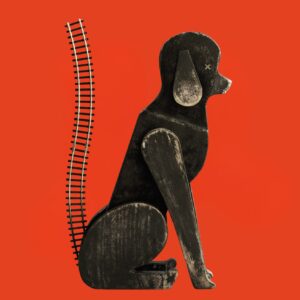
From The Blacksmith’s Daughter by Selim Özdoğan
Translated by Ayça Türkoğlu and Katy Derbyshire
Timur likes going to the cinema to see double bills of Turkish or foreign films; a romance and an adventure film, a drama and a western—it almost doesn’t matter what they show. It’s a treat, but not as much as going to Istanbul; drinking, listening to the beautiful singers and cheering on the footballers. The blacksmith likes sitting motionless in the pleasant darkness of the cinema, soaking up the film music and the actors’ voices. It lets him forget his day. His cares, his work, his itchy calves, his lost wife, his assistant’s mistakes, the heat of the fire in the forge, his favourite cow—all of it vanishes and he grows blissfully tired. He usually nods off, enjoying the feeling of abandoning himself to the heaviness. It’s not like slipping into sleep in bed; sleeping in the cinema is far sweeter.
When he starts to snore, which happens regularly, or when his head droops onto one shoulder, he wakes with a start. Then he gets up and goes for a stroll so as not to bother the other cinemagoers with his snoring. The streets are empty at this time of night, and Timur pulls on his hat, puts his hands in his pockets and saunters through the darkness, savouring the silence and the stars. Then he goes back, but he usually nods off again not much later and gets up for another walk. Timur likes going to the cinema, but not for the films. Even the ones he sees all the way through, he usually forgets by the next day.
Not so for his daughters, who will remember some films for as long as they live. It’s like the radio, only with pictures, he explained to Gül and Melike the first time he took them along. But cinema surpassed Gül’s imagination. Radio with pictures, but her father never said it would get as dark as inside a stable. Nor that you watched people shouting at each other, or sitting alone in a room and crying, and that you were right there but couldn’t do anything about it. Nor did her father tell her that he’d fall asleep and then go outside, leaving her alone with her sister in the big auditorium. Gül put her arm around Melike, not to protect her but to feel that someone was still there, close to her.
Later, she remembered the laughing face, the face of an elderly woman who’d come up with some plan, something Gül didn’t get. The laugh was an evil laugh, a laugh meant to scare you. But not for weeks on end.
Melike seemed to be less afraid, though she’d been grateful for Gül putting her arm around her on their first trip.
Melike likes films; they’re another world that she can live in. Later, she will begin to write down the films she’s watched in a notepad, keeping a film diary. She might change things here and there, making a rich man even richer or inventing an act of selflessness for one of the baddies, giving a woman another daughter or taking a girl’s toy away. But for three years, she will write down all the films she watches, and she’ll dream of one day being in Istanbul too, in Rome or in New York. One day, she too will live in a big city; she’ll be rich and have her hair done just like the women in the films. Her film book is a diary like any other, meant to record her life because she’s yearning for something.
Sibel has nightmares after her first trips to the cinema, but she still goes back again with her sisters and soon she starts drawing film scenes from memory. Eager and proud, she gives her drawings to Melike to put in her book.
The sisters get used to going to the cinema regularly with their father. Even when they’re at the summer house and it’s a long walk, Timur is always glad to take them along. Arzu rarely joins them; she doesn’t like sitting still for so long, and besides, she says she can’t sleep properly after the cinema.
Timur likes going to the cinema to see double bills of Turkish or foreign films; a romance and an adventure film, a drama and a western—it almost doesn’t matter what they show.
There’s more than one film in which children find out at the age of 12 or 14 that their parents aren’t their real parents. The adoptive parents are rich and the real parents are poor, but the children still want to go back to them. In one film, a maidservant finds out that the master of the house is really her father. In another, a boy finds a letter to his stepmother in his father’s drawer. My beloved, it says, my dear, don’t worry about the boy. Once we’ve got rid of my wife, we’ll send him to boarding school and then nothing will stand in the way of our happiness.
All of this stays in Gül’s mind, but nothing leaves as much of an impression on her as the scene where a young man is at his mother’s deathbed and she asks him for a glass of water. When the man returns, she is dead. Gül is 14 and she knows the woman sends her son out of the room because she knows death was on the threshold, because she wanted to be alone with it. I wouldn’t send my child away, Gül thinks.
*
A few days before New Year’s Eve, Gül, Melike and their father are at the cinema, which is heated by glowing sawdust in a specially made stove; wood or coal would be too expensive. The three of them sit in the heated cinema and watch Spartacus. For the rest of her days, Gül will remember the scene where the Romans have captured the slaves and want to know which of them is Spartacus. They threaten to kill every one of them if they don’t betray their leader. Kirk Douglas stands up and says: ‘I am Spartacus.’ Once he’s revealed himself, one slave after another stands up and claims likewise: ‘I am Spartacus.’ The Romans are confused.
When the film is over, Timur isn’t sitting with his daughters.
‘He must be waiting outside,’ Melike says, and the sisters go to the exit. They lose each other in the crush, and all of a sudden, Recep is next to Gül. Out of nowhere. Gül looks at him for an instant; they only have an instant’s eye contact, and then she looks away hastily. Her heart thuds as she tries to push her way faster to the exit.
‘My letter, last month?’ Recep asks in a whisper. She can feel his breath on her ear. And she doesn’t answer. She can’t. She can’t speak, can’t whisper, can’t think; she can’t even walk properly, the crowd helping her on towards the doors. Gül feels something being pressed into her hand and she lets it happen. A moment later she’s outside. It’s bitterly cold and she daren’t turn her head, but she senses that Recep is no longer by her side. She closes her hand tightly around the folded piece of paper. She will read this letter, she will find a way, soon, very soon. This time she’ll find the courage.
Sibel has nightmares after her first trips to the cinema, but she still goes back again with her sisters and soon she starts drawing film scenes from memory.
It’s easy to make out her father in the crowd; he’s taller than all the others. Melike is already with him, and as Gül reaches the two of them, she hears Recep’s voice: ‘Uncle Timur! Uncle Timur, good evening to you. How are you?’
‘Fine, son, thanks be to God, and how are you?’
‘I’m fine too, thanks for asking.’
Recep avoids looking at Gül or Melike; he smiles at the blacksmith who is only a head taller than he is. A pomaded strand of hair falls across his forehead.
‘Do I know you, son?’
‘Yes, Uncle Timur, I’m from the village—you often came to visit us, bought things from my mother… Leyla is her name…’
Timur looks more closely but doesn’t seem to remember him.
‘Recep,’ Recep says now, ‘Recep whose father disappeared to Istanbul.’
‘Oh yes,’ Timur says. ‘So tell me, Recep, how’s your mother?’ Gül bends down to tie her shoelaces.
‘Fine,’ says Recep, ‘she’s fine, thanks for asking.’
There is a pause in the conversation. Timur asks: ‘Well, young man, what team do you support?’
‘Beşiktaş, because they’re the best!’
‘That’s what I like to hear,’ the blacksmith grins.
‘I won’t keep you,’ Recep says. ‘My friends are waiting.’
He gestures towards an empty spot, says a polite goodbye and leaves. Gül doesn’t spy a comb poking out of his back pocket. The little letter is now in her sock.
At home, she takes the letter out on the toilet. Her hands tremble as she carefully puts the torch down on the ground and removes the piece of folded paper. It’s not white, as she expected; it’s printed in different colours. And when she unfolds it, she sees it’s not a letter this time. It’s a lottery ticket for the big New Year’s draw. Recep has given her a ticket. Why did he do that? And why is she so happy about it? She stares at the ticket number as if it’s concealing a secret message. 430512389. It’s a quarter lottery ticket; she can hide it and keep it as a memento. Nothing bad can happen. Gül is too nervous to smile, her heart is still beating too fast, her breathing is still too short. She folds up the ticket and puts it back in her sock.
Recep, she’s sure, would be one of the first to stand up and call out: ‘I am Spartacus.’
On New Year’s Eve, lots of people often gather at the blacksmith’s house. They all praise Arzu for her stuffed vine leaves, which Gül spent the whole afternoon making; for her börek, which Gül spent the morning kneading the dough for, not to mention washing the spinach in ice-cold water until she could no longer feel her hands. They praise her for her pastries, and when Gül is out of the room, she hears her stepmother say: ‘Gül helped me. She’s a young woman now and she’s not just a good cook; she’s thorough, shrewd and quick too.’
When the film is over, Timur isn’t sitting with his daughters.
‘Thorough, shrewd and quick, thorough, shrewd and quick,’ Gül murmurs to herself as she puts on a new pot of tea to boil. The house is packed. Hülya and Zeliha are there; her Uncle Fuat; her Uncle Orhan with his wife and child; neighbours and their families; the blacksmith’s assistant, who has no one else and now sits, quiet and shy, in the corner, not even piping up when he wins the game of bingo. Gül sees his numbers have been called when she serves him his tea, but he just looks blankly at the worn bingo card in front of him and squints as the smoke from his cigarette gets in his eyes.
They always play bingo at New Year’s. Every adult gets a card, and this time Melike is allowed to draw the numbers out of a little bag and call them out. The children sit with their parents or their favourite aunts or uncles, and Gül pours the tea. The minute the game is over, the men and women will separate: the men will sit in the big room and the women will sit in the girls’ room, where Timur has fitted a stove. He’s made a stove just like the one they have at the cinema, because wood shavings cost next to nothing. He’s annoyed that he didn’t think of it sooner.
Only once it approaches eleven o’clock will the men and women huddle together around the radio, which broadcasts songs, sketches, good wishes for the new year and, finally, the results of the New Year’s draw. They sit clutching their eighth, quarter or half tickets excitedly, holding their breath and hoping to start the new year rich.
Timur buys an eighth ticket and a quarter ticket every New Year’s too, and Arzu lays them both out in front of her, muttering to herself before holding her breath when the speaker announces the numbers loud and clear, one after the other, starting with third prize: ‘Four, three, zero, five, one, two, three, eight – and last but not least, ladies and gentlemen; the last number on the winning ticket is…. nine. Congratulations to the lucky winner. And now we come to second prize…’
Gül knows the numbers on her quarter ticket off by heart, but she hadn’t reckoned on it winning. Just like the blacksmith’s assistant, she keeps her victory under wraps. The speaker repeats the numbers and someone curses to themselves. Perhaps Gül’s eyes are glazing over, or maybe it’s just from the smoke in the room.
No one can see how agitated she is, her heart thumping, and when she takes a tray of empty tea glasses into the kitchen, no one hears the spoons chinking against the glass, the saucers rattling on the tray, and no one sees her walking oddly like Auntie Hülya. Everyone is hoping for second prize, or the jackpot. But before the announcement, they play another song to ramp up the tension.
Gül’s legs seem all tangled up, her hands are trembling. She puts the tray down in the kitchen and goes to refill the tea glasses, when the kettle slips out of her hand and she tips boiling water onto her foot.
On New Year’s Eve, lots of people often gather at the blacksmith’s house.
She cries out, her screams cutting into a singer singing of pockets of love filled with pain. Arzu comes running into the kitchen at once, followed soon after by Hülya and a neighbour. Gül stands there, still screaming. Her mother shouts: ‘Off, get those socks off!’
Gül can’t respond; she stops screaming but she can’t move. Her mother stands behind her, grabs her under the armpits, and links her hands across Gül’s chest. The neighbour woman kneels down and pulls Gül’s sock off. She was lucky, there wasn’t much water left in the kettle. When she starts to cry, they sit Gül down on a stool and plunge her foot into a basin of cold water.
‘You must have been a bit clumsy,’ Arzu says, and Gül cries even more. But she no longer knows if it’s from happiness or pain. Or bewilderment. Third prize, and she has a quarter ticket; it’s so much money she can hardly imagine it. What could she buy with it? Dresses for her sisters; and shoes, so they’d each have two pairs; the chocolate that Melike likes so much; pencils for Sibel – paper and coloured pencils, even watercolours; a toy for Emin, maybe a spinning top; a musical instrument for Nalan. And the midnight blue fabric – she could buy the midnight blue fabric to sew herself a dress, and she could buy a cardigan. She could give some to her father and her mother and Auntie Hülya, and still there would be some left over.
‘I won,’ she mumbles through her tears, but no one seems to hear her. They take Gül to bed, and Auntie Hülya smears honey on her foot.
‘It will ease the pain,’ she explains. ‘It’s not too bad, you don’t have a blister, it will stop hurting soon. You were lucky.’
She brushes Gül’s hair out of her eyes gently and smiles at her. Gül smiles too. She has been lucky.
‘My big brave girl, what a way to start the new year.’
Gül hears the quiet rustling of paper in her pillow. Or is she just imagining it? She folded the ticket up small and sewed it into her pillow. And every day since, she’s thought about what would happen if someone found it. But who would find it? Their mother never makes their beds. Melike might hear the rustling and guess at once that Gül has hidden something. When they’re playing, Gül always knows the best hiding places, but now that it’s serious, she’s scared.
Much later, when everyone’s asleep, Gül cries quietly into her pillow. There’s no way she can show her ticket to anyone. Who would believe her if she told them she’d found it on the street or saved up for it herself? And the truth? Who would accept the truth? No one. No one would believe that Recep had given her the ticket as a gift: Why had he given it to her? What for? Where did they meet? How long had she been meeting up with him? Why was she talking to him?
What should she do now, what should she do with this cursed winning ticket? Why did Recep have to give her such a thing? Can’t she just slip in into her father’s trouser pocket? And what if she gets caught? She could never explain how she’d got into the situation in the first place. And even if she did, he’d just be baffled when he found it. He’d be baffled and throw it away. How would he know it had won third prize in the big New Year’s draw?
Three days later, she’s still limping, but only a little, and the ticket goes the same way Recep’s letter went. It floats downstream to the sea Gül’s never seen; it ends in salt water.
__________________________________
Excerpted from The Blacksmith’s Daughter by Selim Özdoğan, translated by Ayça Türkoğlu and Katy Derbyshire. Excerpted with the permission of V&Q Books.
Lit Hub Excerpts
An excerpt every day, brought to you by Literary Hub.



















